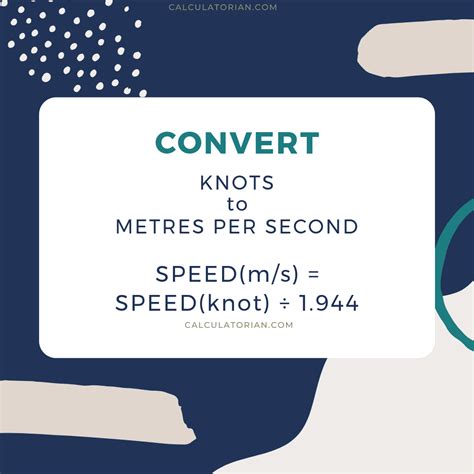Meters Per Second To Knots

Understanding the Conversion from Meters Per Second to Knots

When it comes to measuring speed, especially in maritime and aviation contexts, two common units are meters per second (m/s) and knots. While meters per second is part of the International System of Units (SI) and is widely used in physics and other sciences for expressing speed, knots are more commonly used in navigation and meteorology. In this article, we will delve into the conversion process from meters per second to knots, discussing the significance of these units, the conversion factor, and practical examples.
What are Knots and Meters Per Second?

Knots: A knot is a unit of speed equal to one nautical mile per hour. One nautical mile is the length of one minute of latitude on the Earth’s surface, which is approximately 6,076.1 feet or 1,852 meters. Knots are primarily used to measure the speed of ships, boats, and aircraft relative to the surrounding air or water.
Meters Per Second (m/s): This is the standard unit of speed in the International System of Units (SI). It represents the distance traveled in meters divided by the time taken in seconds. It is a fundamental unit used across various disciplines, including physics, chemistry, and biology.
Conversion from Meters Per Second to Knots

To convert meters per second to knots, we need to know the conversion factor. Given that 1 knot is equal to 1 nautical mile per hour, and there are 3,600 seconds in an hour, we can derive the conversion factor as follows:
1 knot = 1 nautical mile/hour
1 nautical mile = 1,852 meters
1 hour = 3,600 seconds
So,
1 knot = 1,852 meters / 3,600 seconds ≈ 0.51444 meters/second
The conversion factor from meters per second to knots is approximately 1 m/s = 1.94384 knots.
Practical Conversion Steps

- Basic Conversion: To convert a speed from meters per second to knots, you simply multiply the speed in meters per second by the conversion factor 1.94384.
Example: 5 meters per second = 5 m/s * 1.94384 knots/m/s ≈ 9.7192 knots
Conversion with Precision: If you need more precise calculations, ensure to keep more decimal places in your conversion factor and intermediate steps.
Real-world Applications: In real-world scenarios, especially in navigation and weather forecasting, converting between these units can be critical for understanding and comparing speeds in different contexts.
🌊 Note: It's crucial to remember the conversion factor for quick calculations, especially in professional settings where precision and time are of the essence.
Importance of Understanding Conversion Factors

Understanding how to convert between different units of measurement is essential for effective communication and accurate calculations in various fields. The conversion from meters per second to knots highlights the importance of being familiar with different measurement systems and knowing how to switch between them seamlessly.
Conclusion

The ability to convert speed from meters per second to knots is a valuable skill, especially in maritime, aviation, and meteorological contexts. By grasping the conversion process and applying it practically, individuals can enhance their professional efficiency and contribute to clearer communication across disciplines.
Why is it important to convert meters per second to knots?

+
Converting meters per second to knots is crucial in maritime, aviation, and meteorological contexts for effective communication and accurate calculations.
What is the conversion factor from meters per second to knots?

+
Approximately 1 meter per second equals 1.94384 knots.
How do I convert meters per second to knots practically?

+
Simply multiply the speed in meters per second by the conversion factor 1.94384.